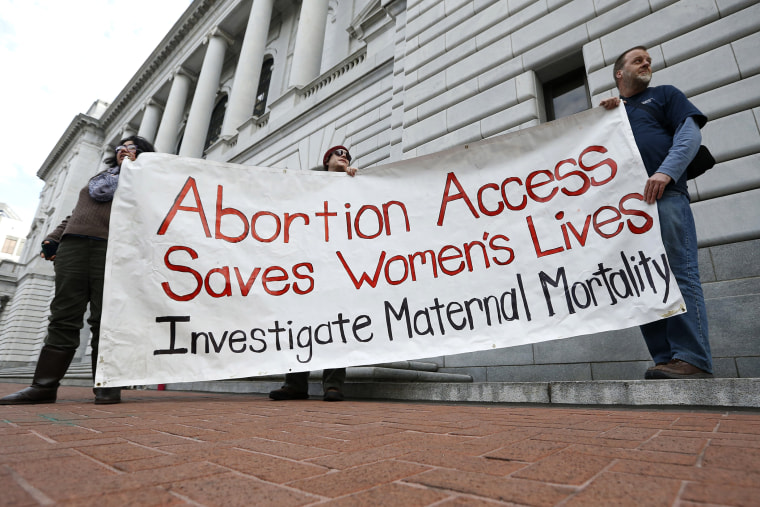The abortion rights battle at the Supreme Court just got even more urgent.
A week before the Supreme Court is slated to hear arguments in a challenge to a law that could shut down all but ten of Texas's abortion clinics, three of Louisiana's four clinics are facing closure on similar grounds -- unless the Supreme Court steps in.
On Wednesday, the 5th Circuit Court of Appeals said Louisiana could enforce its requirement that abortion providers have admitting privileges at local hospitals, overruling a district court judge who found the law to be an unconstitutional violation of women's rights. The same appeals court twice approved Texas's new requirements for abortion clinics, and next week, in Whole Woman's Health v. Hellerstadt, the Supreme Court will hear oral arguments in the Texas abortion clinics' appeal.
RELATED: What happens to the big Supreme Court cases after Scalia's death
“We will immediately seek emergency relief from the Supreme Court so these clinics are able to reopen and continue serving the women of Louisiana," said Nancy Northup, CEO of the Center for Reproductive Rights, in a statement. “Whether in Louisiana, Texas, or elsewhere, women should not be forced to run to court year after year to protect their fundamental rights. It’s time for the U.S. Supreme Court to make it clear that politicians cannot sneak around the Constitution to rob women of their right to safe and legal abortion."
The Texas clinics have twice gone to the Supreme Court seeking similar emergency relief to what Louisiana's clinics will ask for, with mixed results. The first time the Texas clinics asked the court to temporarily save them from the Circuit's decision on an admitting privileges requirement, in November 2013, they were rebuffed, resulting in the closure of more than a dozen clinics. But a year later, with over a dozen more clinics set to close because of Texas's requirement that abortions take place in ambulatory surgical centers, the Supreme Court agreed to thwart the 5th Circuit, and will now hear the case itself.
The unknown factor in Whole Woman's Health is how it will be affected by Justice Antonin Scalia's death on February 13. The outcome of the case still depends on Justice Anthony Kennedy's vote, but if he sides with the state of Texas and the expected votes of the court's four other conservatives, the 4-4 tie would limit the result to the Fifth Circuit. That would force abortion clinics to close in Texas, Louisiana, and likely Mississippi, which has an admitting privilege law that would close that state's last clinic. But a tie would also prevent the Supreme Court from setting a precedent for the entire country, including in states where judges have already blocked similar laws as lacking justification and infringing on women's rights. Alternatively, Kennedy could vote to strike down the laws nationwide as posing an "undue burden" on women's previously-recognized constitutional right to end a pregnancy.
Louisiana and Texas legislators have said they are simply trying to protect women's health with the new regulations. The American Medical Association and the American College of Obstetricians and Gynecologists have filed a brief in the Texas case saying the laws are medically unnecessary and actually harm women's health by limiting their access to legal abortion.
The Louisiana law was signed by Governor Bobby Jindal in June 2014, but a federal judge has so far blocked it from taking effect as the clinics challenge it in court. The Center for Reproductive Rights, representing clinics in Shreveport, Bossier City, and Metairie, says doctors there have tried to comply with the new requirement that they have admitting privileges at local hospitals within 30 miles, but that hostility toward abortion, among other factors, has stood in their way. One doctor testified at a hearing before the district court that a department director at a local hospital would not even send an application form because of his work providing abortions. The providers also say they have had difficulty obtaining hospital admitting privileges because abortion complication rates are so low that they admit so few patients.
Related: Shuttered: the end of abortion access in red America
A spokeswoman for the Center said two of the Louisiana clinics would be forced to close immediately, and that Hope Medical Group would be able to wait until the Supreme Court rules on the emergency appeal. One physician there has admitting privileges, according to the district court judge's order, because he was able to meet the requirements to admit patients "as part of his private OB/GYN practice, not because of his work at Hope Clinic."
The Metairie clinic closed earlier this month. Planned Parenthood has been trying to build a new facility that provides abortions in New Orleans, but was delayed by significant opposition from the Jindal administration. That clinic is now expected to open at the end of the year.
According to the Guttmacher Institute, a nonprofit organization that supports abortion rights, "24 states have laws or policies that regulate abortion providers and go beyond what is necessary to ensure patients’ safety." Such laws are being challenged in states from Alabama to Wisconsin, pending whatever the Supreme Court decides.
Editor's Note: This story originally said the doctor at the Metairie clinic retired. In fact, the clinic closed because the doctor decided to stop performing abortions pending the resolution of the litigation over admitting privileges.
